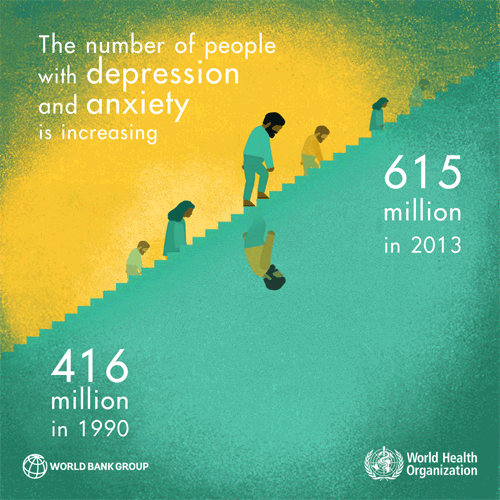Last week was
World Health Day, sponsored by the
World Health Organization (WHO). This year, the day is focused on raising awareness about the prevalence of depression through the
“Depression: Let’s Talk” campaign. As with many different areas of global health,
Big Data and
Artificial Intelligence are being used in innovative ways to help address depression.

 Figure 1: WHO's Campaign focuses on raising awareness about depression.
Figure 1: WHO's Campaign focuses on raising awareness about depression.
According to the
WHO, over 300 million people worldwide live with depression, making it the
world's leading cause of poor health and disability. It is also on the rise, as the number of people with depression
increased almost 20% between 2005 and 2015.
Despite its prevalence, though, depression and other mental health disorders received very little support.
WHO research shows most governments only allocate between 1% to 5% of their total health budgets for
mental health, which must address a variety of other concerns in addition to depression. Even if there were funding, though, most people would still miss out on treatment. In high-income countries, half of adults living with depression do not seek treatment, as depression still carries with it a
negative social stigma many parts of the world. The number is
even higher in low-income countries, where depression treatment is viewed as a frivolous or unnecessary expense.
Researchers around the world are using
Big Data to try and understand the genetic causes of depression. In 2016, a team of researchers from the
University of Pennsylvania and
Massachusetts General Hospital released
a report detailing their findings of 15 different genetic locations that identified people as at risk for
major depression. For
their study, the team relied on data supplied by the genetic testing company
23andMe. Customers send saliva samples to 23andMe to get genetic tests and an ancestry map, and some also agreed to let the company anonymously use their
genetic data for research. The University of Pennsylvania and Massachusetts General Hospital team were able to use this aggregated data set to
identify the genes indicating depression risk.
Because the way
depression manifests itself in different people widely varies, having more precise information about its root cause can help doctors administer more
precise treatment. Although there is still much to be done to actualize the results of this study in terms of treatment,
the findings are an important step. Additionally, they also help
address the stigma issue by showing that some depression is linked to biology.
Facebook, which owns Instagram, is also
using AI to try and go a step further than identification to
intervention. After numerous people used the livestream feature to
livestream their suicide, the company increased its
suicide prevention initiative. They use an
AI-based algorithm to flag high-risk users and send them to community managers, who can reach out with resources for help. Facebook hopes this algorithm will help them intervene and help people who need it most.
Depression is not something that can be cured solely through leveraging
Big Data and
Artificial Intelligence. It is a complex problem with many different factors at work. However, these technologies can be valuable tools for improving treatment, identifying and monitoring those in need and hopefully
reducing the stigma surround depression so more people reach out to get help.
If you would like more information about depression, check out these
WHO resources.

 Figure 1: WHO's Campaign focuses on raising awareness about depression.
Figure 1: WHO's Campaign focuses on raising awareness about depression.
 Figure 2: The number of people who suffer from depression is growing, but health budget allocation is not increasing (Image: WHO)
Figure 2: The number of people who suffer from depression is growing, but health budget allocation is not increasing (Image: WHO)
 Figure 3: Researchers are using AI to detect whether people are depressed based upon photos shared on Instagram.
Figure 3: Researchers are using AI to detect whether people are depressed based upon photos shared on Instagram.
 Hybrid Cloud
Hybrid Cloud Cyber Security & NaaS
Cyber Security & NaaS AI & Data
AI & Data IoT & Connectivity
IoT & Connectivity Business Applications
Business Applications Intelligent Workplace
Intelligent Workplace Consulting & Professional Services
Consulting & Professional Services Small Medium Enterprise
Small Medium Enterprise Health and Social Care
Health and Social Care Industry
Industry Retail
Retail Tourism and Leisure
Tourism and Leisure Transport & Logistics
Transport & Logistics Energy & Utilities
Energy & Utilities Banking and Finance
Banking and Finance Sports
Sports Smart Cities
Smart Cities


